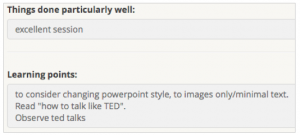Thank you to Carrie Thomas for her insights and thoughts on her #presentationskills journey
There are key moments of feedback that stick with you and can be practise changing. For presenting, my development journey started back in 2015 with a consultant who fed back on my local teaching session:

His face as I replied “TED – what” was like when someone hasn’t heard about that band or food that you can’t live without. So then began the reading of books about TED talks, and as my Twitter feed would attest, viewing (& tweeting about) TED talks online.
The three days in Dublin for #SMACCdub reinforced the value of this presentation style, and it was there on the Wednesday morning that the presentation “Things That Scare Me” brought myself and friends to tears as we listened to one of the best talks I have ever heard live. More by luck, than planning, I also sat in on Ross’ “The Greatest Presentation in the World…Tribute” presentation. Despite his, and many other’s great examples, it still felt somewhat out of reach to achieve that standard of presentation myself.
Nonetheless, I attempted to minimise the text on slides and to deliver with more of a “story” or “p1” component. Further formal feedback essentially set the challenge to start presenting to larger audiences – public speaking is not a natural place I’d want to be in a lecture theatre; honestly, I’m more commonly found towards the back!
In seeking out opportunities to present to “larger audiences” I had an abstract accepted to present at the Northern EM Conference (@NEMConference) in January 2017, and in the final week before it, a quick reply all to the speakers about what 16:9 and 4:3 left me regretting sending this email:
Dog on stage!! #NEMC17 pic.twitter.com/QRGi5qKJ4i
— twitfrg (@twitfrg) January 10, 2017
At least that was until Ross kindly replied with an explanation and encouragement, which then became an offer to look at my slides and content of what the “p1” would be. He quite simply coached me for my presentation! It was a surprise to have such fantastic input from a consultant I’d never met, or to whom he had no responsibility to in a formal Educational or Clinical Supervisor role. Ross’ enthusiasm and knowledge for sharing presentation skills were clear.
Despite feeling like I needed to “bounce” my breakfast the morning of the conference I managed to get through the presentation, shared my story of burnout and experiencing bullying in EM; bookended with #BellaCollie almost died as a puppy from a stick injury; and just to prove she was still alive she came up on stage at the end – which seems to have been the main highlight tbh!
The messages of the talk were communicated and it initiated lots of discussions afterwards. Only having a few words, if at all, and relevant images on my slides had meant I could speak to the audience, rather than read off my slides!
@doccarrie fantastic talk, very brave to speak about your difficult experiences as a trainee. Bullying has no place in the ED #NEMC17
— Andywebster (@Andywebster) January 10, 2017
Discussing my presentation, and more generally about presentation skills, with both Ross, Simon Carley and the all-important GnT afterwards, it was clear both of them really saw things in a presentation that wouldn’t have occurred to me before, e.g. in terms of stage positioning, body language, tone of voice, did the P3 match the P1? When I reflected back that it was scary looking out into the audience because most people looked bored – apparently this was the idea for Ross’ blog on “Resting Face”. It was clear that attending the #dasTTC the following June would be incredibly worthwhile and the Teaching Course is something I can’t recommend enough – do get yourself to the Manchester course if you can!
The past three years I have been on an incredible journey of developing my presentation skills, one that is by no means finished and I anticipate will be a lifelong learning. I find breaking down the preparation of my talks into the p-cubed format really helps me to distil the message and content for a presentation. As advised I now start my preparation with my laptop shut:
Time to start preparing my presentation for @LeadersHealth Taking @ffolliet advice – laptop closed; pen & paper out (with post-its too) pic.twitter.com/laP7Th1kMX
— Carrie Thomas (@doccarrie) September 11, 2017
I can but only encourage you to ask for feedback from a trusted friend or colleague; it was incredibly nerve-racking having Ross watch me present at #EMTA17 the talk I gave at #NEMC17 but I asked him before if he would give me feedback afterwards. He was kind and insightful, mainly getting me to draw out the things to improve on and ensuring that I had registered how well it had gone and checking I had heard the applause at the end.
Take that bold step to making changes to your presentation skills by using the knowledge that Ross shares on his website and in person – I promise you won’t be disappointed. Losing the bullet points has helped me find my voice.
